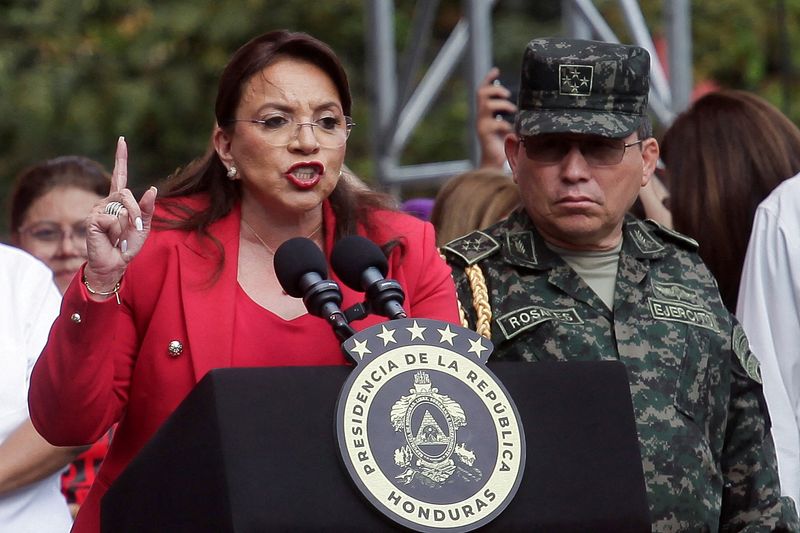[ad_1]
By Orfa Mejia and Brendan O’Boyle
TEGUCIGALPA/MEXICO CITY (Reuters) – Washington urged Honduras to reconsider its intention to leave a long-standing extradition treaty on Thursday, as Honduran President Xiomara Castro warned of a plot against her leftist government amid a fresh diplomatic row between the two nations.

Castro, who ordered her government to withdraw from the treaty after the U.S. ambassador expressed concern over a meeting between Honduran and Venezuelan defense officials, suggested the treaty was being used to intervene in domestic affairs.
„A plan is being hatched against my government and it’s important that the people know this,” said Castro.
„I won’t allow the extradition instrument to be used to intimidate or blackmail the Honduran Armed Forces. We’re defending our armed forces, not coups,” she added.
The extradition treaty remains in force, according to a U.S. State Department spokesperson who spoke on background. The official defended extradition as mutually beneficial to both countries.
„We strongly urge the government of Honduras to reconsider this decision,” the spokesperson added in a statement to Reuters, arguing efforts to combat drug trafficking would be hurt if it stands.
The extradition treaty, which has been in place for over a century, has facilitated the extradition of high-profile Hondurans to the U.S., including Castro’s predecessor, former President Juan Orlando Hernandez.
Tensions ignited between the U.S. and Honduras this week after U.S. Ambassador to Honduras Laura Dogu said she was „surprised” to see Honduran officials sit down with „drug traffickers.”
Last week, top Honduras military leaders met in the Central American country with Venezuelan Defense Minister Vladimir Padrino, who faces drug trafficking charges in the U.S.
Honduran Foreign Minister Enrique Reina said earlier on Thursday that a coup was being promoted within the country’s military, saying that Dogu’s statement „practically accuses” senior Honduran military leaders of involvement in drug trafficking.
Castro’s government sees socialist-run Venezuela, whose government Washington considers illegitimate, as a close ally. Her husband, former President Manuel Zelaya, was deposed in a 2009 coup after aligning with late Venezuelan President Hugo Chavez.

The United States, meanwhile, has long played a large role in Honduran politics, basing troops there since the Cold War and backing Hernandez even after claims of fraud in his 2017 reelection.
The U.S. Embassy in Honduras did not reply to requests for comment.
[ad_2]
Source link

